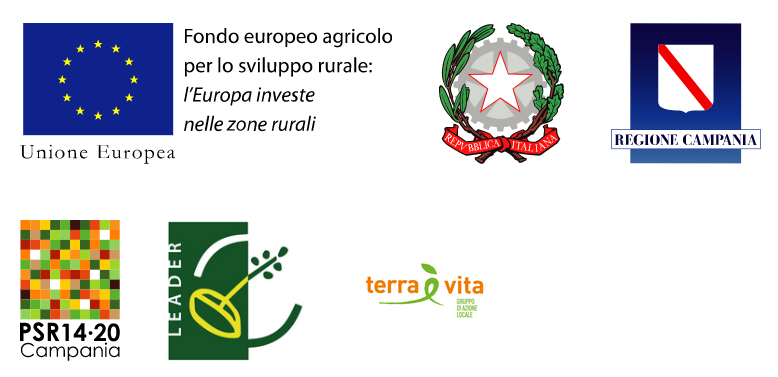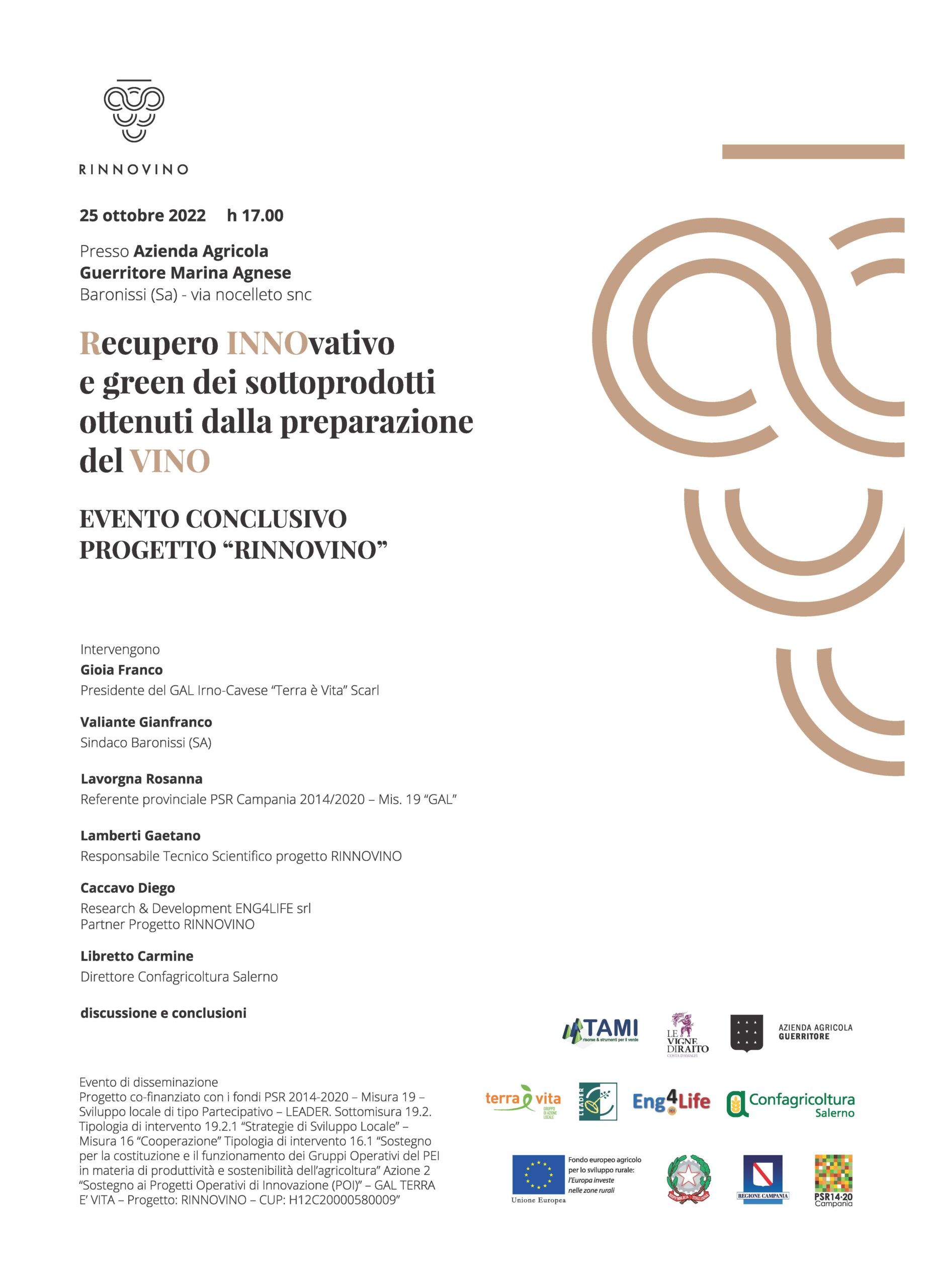
The project Innovative and green recovery of the by-products obtained from the preparation of wine (RINNOVINO) is a project co-financed with the 2014-2020 PSR funds – Measure 19 – Participatory local development – LEADER. Submeasure 19.2. Type of intervention 19.2.1 “Local Development Strategies” – Measure 16 “Cooperation” Type of intervention 16.1 “Support for the establishment and functioning of the EIP Operational Groups on agricultural productivity and sustainability” Action 2 “Support for Operational Innovation Projects (POI) ”- GAL TERRA E ‘VITA. The CUP of the project is: H12C20000580009.
The project involves Eng4Life as a technical-scientific partner. The other partners of the project are:
- T.A.M.I. srl
- Azienda Agricola Malanga Patrizia Antonella Anna Maria
- Azienda Agricola Guerritore Marina Agnese
- Salerno Agriservice Srl
The rich and heterogeneous partnership is necessary to ensure the completeness of the POI, as each of the individual companies will provide the knowledge, raw materials and previous experience necessary to achieve the project objectives.
The project
The consumption of grapes and derived products, especially wine, has been associated with numerous positive effects on health; in fact, grapes contain numerous nutrients such as sugars, vitamins, mineral salts, fibers and phytochemicals. Among the latter, polyphenols have proved to be the most important compounds in determining the positive effects of the fruit and derivative products. Grapes are one of the richest fruits in polyphenols, whose composition is strongly influenced by various factors such as the variety or cultivar, the environmental conditions in which ripening takes place, any diseases such as fungal infections, as well as the processing it undergoes. The Rinnovino project consists of the study and implementation of a new process for reusing waste materials from winemaking processes, which will lead to the obtaining of a new nutraceutical product, based on the polyphenols contained in the pomace, considered natural antioxidants. The winemaking process produces various residues such as lees and pomace, the latter are a source of organic substance, polyphenols, nitrogen, macro and microelements. This feature makes these by-products not a waste but a resource to be exploited. The pomace not intended for the distillery can be used in different ways. There is a wide use of pomace in the field of cosmetics, grape skins extracts, rich in polyphenols, are able to exert an anti-inflammatory and counteracting action against free radicals, therefore against aging. It is known, in fact, that in the marc there are many molecules of great application interest, such as anthocyanins and antioxidants, in particular the well-known resveratrol. The latter is the antioxidant contained in grapes of greatest activity and notoriety, and recently it has also been hypothesized its role in fighting coronavirus infections and in particular CoViD-19. The use for nutraceutical purposes of what is currently waste from the processing, that is the pomace from the pressing of grapes, is efficient, effective and ecological.
Purpose
The Rinnovino project has as its objective the use for nutraceutical purposes of what for now is a processing waste, that is the pomace of pressing of grapes by proposing an innovative process focused on the reuse and recycling of wine production by-products, generating new economic value for companies in the sector (competitiveness), creating an innovative product with high added value (diversification). To achieve this goal, it intends to pursue the following main objectives:
- Creation of a prototype on a pre-pilot scale for the extraction of polyphenols from marc, by-products of the winemaking process.
- The creation of an innovative product, based on polyphenols extracted from the marc, to be placed on the market.
- Economic and technical feasibility study of the conversion of exhausted material from extraction into RDF (fuel derived from waste). Generating a complete reuse of the by-products deriving from the winemaking process.
- Dissemination of the results of the innovation project to ensure an adequate transfer of innovation to the farms in the area concerned through social channels, websites, workshops and specialized articles.
Expected results
Campania, with its important wine landscape, over 23,000 hectares of cultivated vineyards with a production of over 1.3 million hectoliters and 249 farms, is fully included in the category of “wine regions The Rinnovino project is based on the belief that the diversification of company products is a strategic asset for the regional production sector, protecting it from any stagnation of the main product market. To this end, through the realization of the project, it is intended to enhance all the potential products of the winemaking process starting from the must, which could represent a resource of fundamental importance especially for small ones who need to make the most of the available resources. The goal is therefore to transform the problem of disposal of production waste into a double opportunity, leading to an innovative product of nutraceutical interest and a certain energy recovery, while reducing the volume and impact of waste. The level of transferability to Campania farms is high. All companies in this sector have to face the problem of disposing of pomace. Currently the most common practice is to deliver the pomace to a distillery, this practice does not allow the farm to exploit the “resource” obtained from the winemaking process. The innovation object of the project, on the other hand, provides for further economic benefit from what is now a waste. We imagine a solution on a medium-small scale, which is easily achievable in the wine-growing realities of the territory subject to the intervention, and not only, so that the solution can constitute an opportunity for all the companies concerned, through a small durable investment represented by the construction of a plant for the extraction and transformation of waste into the final innovative product.
Total cost of the project: € 119,927.34
of which attributable to Eng4Life: € 58,150.00.
The final event will take place on 25 October 2022.
Headquarters: Azienda Agricola Guerritore Marina Agnese, via nocelleto snc, Baronissi (SA).

